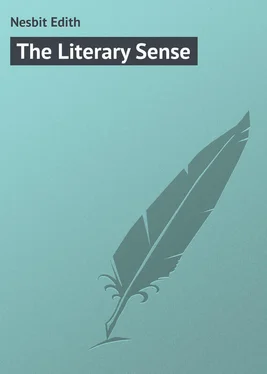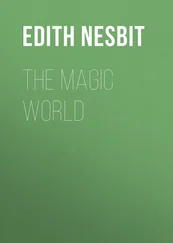Edith Nesbit - The Literary Sense
Здесь есть возможность читать онлайн «Edith Nesbit - The Literary Sense» — ознакомительный отрывок электронной книги совершенно бесплатно, а после прочтения отрывка купить полную версию. В некоторых случаях можно слушать аудио, скачать через торрент в формате fb2 и присутствует краткое содержание. Жанр: foreign_prose, на английском языке. Описание произведения, (предисловие) а так же отзывы посетителей доступны на портале библиотеки ЛибКат.
- Название:The Literary Sense
- Автор:
- Жанр:
- Год:неизвестен
- ISBN:нет данных
- Рейтинг книги:4 / 5. Голосов: 1
-
Избранное:Добавить в избранное
- Отзывы:
-
Ваша оценка:
- 80
- 1
- 2
- 3
- 4
- 5
The Literary Sense: краткое содержание, описание и аннотация
Предлагаем к чтению аннотацию, описание, краткое содержание или предисловие (зависит от того, что написал сам автор книги «The Literary Sense»). Если вы не нашли необходимую информацию о книге — напишите в комментариях, мы постараемся отыскать её.
The Literary Sense — читать онлайн ознакомительный отрывок
Ниже представлен текст книги, разбитый по страницам. Система сохранения места последней прочитанной страницы, позволяет с удобством читать онлайн бесплатно книгу «The Literary Sense», без необходимости каждый раз заново искать на чём Вы остановились. Поставьте закладку, и сможете в любой момент перейти на страницу, на которой закончили чтение.
Интервал:
Закладка:
E. Nesbit
The Literary Sense
THE UNFAITHFUL LOVER
SHE was going to meet her lover. And the fact that she was to meet him at Cannon Street Station would almost, she feared, make the meeting itself banal, sordid. She would have liked to meet him in some green, cool orchard, where daffodils swung in the long grass, and primroses stood on frail stiff little pink stalks in the wet, scented moss of the hedgerow. The time should have been May. She herself should have been a poem – a lyric in a white gown and green scarf, coming to him through the long grass under the blossomed boughs. Her hands should have been full of bluebells, and she should have held them up to his face in maidenly defence as he sprang forward to take her in his arms. You see that she knew exactly how a tryst is conducted in the pages of the standard poets and of the cheaper weekly journals. She had, to the full limit allowed of her reading and her environment, the literary sense. When she was a child she never could cry long, because she always wanted to see herself cry, in the glass, and then of course the tears always stopped. Now that she was a young woman she could never be happy long, because she wanted to watch her heart's happiness, and it used to stop then, just as the tears had.
He had asked her to meet him at Cannon Street; he had something to say to her, and at home it was difficult to get a quiet half-hour because of her little sisters. And, curiously enough, she was hardly curious at all about what he might have to say. She only wished for May and the orchard, instead of January and the dingy, dusty waiting-room, the plain-faced, preoccupied travellers, the dim, desolate weather. The setting of the scene seemed to her all-important. Her dress was brown, her jacket black, and her hat was home-trimmed. Yet she looked entrancingly pretty to him as he came through the heavy swing-doors. He would hardly have known her in green and white muslin and an orchard, for their love had been born and bred in town – Highbury New Park, to be exact. He came towards her; he was five minutes late. She had grown anxious, as the one who waits always does, and she was extremely glad to see him, but she knew that a late lover should be treated with a provoking coldness (one can relent prettily later on), so she gave him a limp hand and no greeting.
"Let's go out," he said. "Shall we walk along the Embankment, or go somewhere on the Underground?"
It was bitterly cold, but the Embankment was more romantic than a railway carriage. He ought to insist on the railway carriage: he probably would. So she said —
"Oh, the Embankment, please!" and felt a sting of annoyance and disappointment when he acquiesced.
They did not speak again till they had gone through the little back streets, past the police station and the mustard factory, and were on the broad pavement of Queen Victoria Street.
He had been late: he had offered no excuse, no explanation. She had done the proper thing; she had awaited these with dignified reserve, and now she was involved in the meshes of a silence that she could not break. How easy it would have been in the orchard! She could have snapped off a blossoming branch and – and made play with it somehow. Then he would have had to say something. But here – the only thing that occurred to her was to stop and look in one of the shops till he should ask her what she was looking at. And how common and mean that would be compared with the blossoming bough; and besides, the shops they were passing had nothing in the windows except cheap pastry and models of steam-engines.
Why on earth didn't he speak? He had never been like this before. She stole a glance at him, and for the first time it occurred to her that his "something to say" was not a mere excuse for being alone with her. He had something to say – something that was trying to get itself said. The keen wind thrust itself even inside the high collar of her jacket. Her hands and feet were aching with cold. How warm it would have been in the orchard!
"I'm freezing," she said suddenly; "let's go and have some tea."
"Of course, if you like," he said uncomfortably; yet she could see he was glad that she had broken that desolate silence.
Seated at a marble table – the place was nearly empty – she furtively watched his face in the glass, and what she saw there thrilled her. Some great sorrow had come to him. And she had been sulking! The girl in the orchard would have known at a glance. She would gently, tenderly, with infinite delicacy and the fine tact of a noble woman, have drawn his secret from him. She would have shared his sorrow, and shown herself "half wife, half angel from heaven" in this dark hour. Well, it was not too late. She could begin now. But how? He had ordered the tea, and her question was still unanswered. Yet she must speak. When she did her words did not fit the mouth of the girl in the orchard – but then it would have been May there, and this was January. She said —
"How frightfully cold it is!"
"Yes, isn't it?" he said.
The fine tact of a noble woman seemed to have deserted her. She resisted a little impulse to put her hand in his under the marble table, and to say, "What is it, dearest? Tell me all about it. I can't bear to see you looking so miserable," and there was another silence.
The waitress brought the two thick cups of tea, and looked at him with a tepid curiosity. As soon as the two were alone again he leaned his elbows on the marble and spoke.
"Look here, darling, I've got something to tell you, and I hope to God you'll forgive me and stand by me, and try to understand that I love you just the same, and whatever happens I shall always love you."
This preamble sent a shiver of dread down her spine. What had he done – a murder – a bank robbery – married someone else?
It was on the tip of her tongue to say that she would stand by him whatever he had done; but if he had married someone else this would be improper, so she only said, "Well?" and she said it coldly.
"Well – I went to the Simpsons' dance on Tuesday – oh, why weren't you there, Ethel? – and there was a girl in pink, and I danced three or four times with her – she was rather like you, side-face – and then, after supper, in the conservatory, I – I talked nonsense – but only a very little, dear – and she kept looking at me so – as if she expected me to – to – and so I kissed her. And yesterday I had a letter from her, and she seems to expect – to think – and I thought I ought to tell you, darling. Oh, Ethel, do try to forgive me! I haven't answered her letter."
"Well?" she said.
"That's all," said he, miserably stirring his tea.
She drew a deep breath. A shock of unbelievable relief tingled through her. So that was all! What was it, compared with her fears? She almost said, "Never mind, dear. It was hateful of you, and I wish you hadn't, but I know you're sorry, and I'm sorry; but I forgive you, and we'll forget it, and you'll never do it again." But just in time she remembered that nice girls must not take these things too lightly. What opinion would he form of the purity of her mind, the innocence of her soul, if an incident like this failed to shock her deeply? He himself was evidently a prey to the most rending remorse. He had told her of the thing as one tells of a crime. As the confession of a crime she must receive it. How should she know that he had only told her because he feared that she would anyhow hear it through the indiscretion of the girl in pink, or of that other girl in blue who had seen and smiled? How could she guess that he had tuned his confession to the key of what he believed would be an innocent girl's estimate of his misconduct?
Following the tingle of relief came a sharp, sickening pinch of jealousy and mortification. These inspired her.
Читать дальшеИнтервал:
Закладка:
Похожие книги на «The Literary Sense»
Представляем Вашему вниманию похожие книги на «The Literary Sense» списком для выбора. Мы отобрали схожую по названию и смыслу литературу в надежде предоставить читателям больше вариантов отыскать новые, интересные, ещё непрочитанные произведения.
Обсуждение, отзывы о книге «The Literary Sense» и просто собственные мнения читателей. Оставьте ваши комментарии, напишите, что Вы думаете о произведении, его смысле или главных героях. Укажите что конкретно понравилось, а что нет, и почему Вы так считаете.












